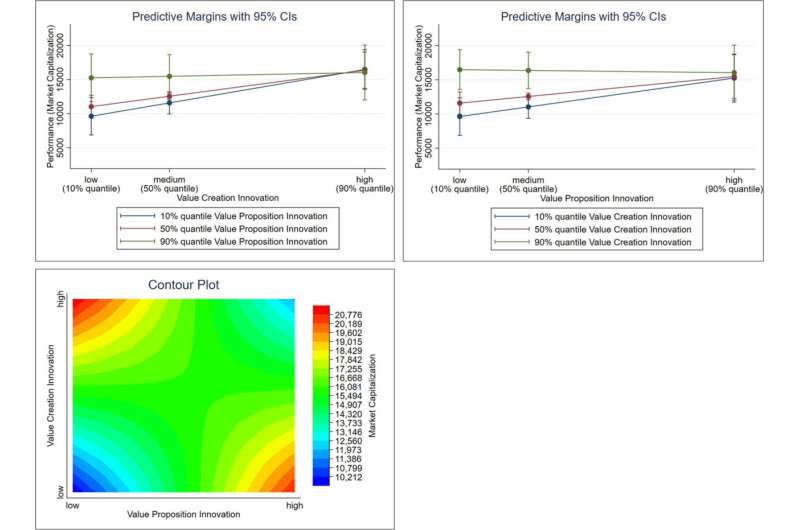This article has been reviewed according to Science X's editorial process and policies. Editors have highlighted the following attributes while ensuring the content's credibility:
fact-checked
peer-reviewed publication
proofread
Is innovation in business measurable?

Despite the growing interest in Business Model Innovation (BMI), there is a lack of robust empirical evidence regarding its long-term effects. This gap is now being filled by the research efforts of authors Prof. Dr. Lutz Göcke (HS Nordhausen), Matthias Menter (FSU), Dr. Christopher Zeeb (FSU), and Thomas Clauss (Uni Witten). Methodologically, the effects and distinctions of three dimensions are examined: value creation, value proposition and value capture. In other words: How is value created? What is value promised? How is this value measured?
But what exactly does the term Business Model Innovation (BMI) encompass? It refers to the adaptation or redesign of business models that can influence a company's success. Such changes can provide significant competitive advantages to companies. Especially in startups, it's evident that altering the business model is positively correlated with a company's success.
However, for established companies, the consequences of business model innovations are more intricate and less obvious. These changes can have profound impacts: company processes might need fundamental restructuring, market positioning can shift, or even existing business segments might be affected or replaced. This necessitates a reevaluation of resource allocation.
The study was based on comprehensive data collection, involving the analysis of more than 35,000 press releases. It encompassed more than 2,300 BMI events from 60 German publicly traded companies, which were then compared against fixed performance metrics. The findings, published in the Journal of Business Research, reveal a positive effect of business model innovation on company performance, even if this effect occurs with a time delay.
The authors have identified that different parts of a business model can have both positive and negative effects. Importantly, a company can develop better if it focuses its efforts on specific dimensions rather than distributing them equally across many.
The results of this study have far-reaching implications for the strategic management of business model innovations. Managers are encouraged to plan careful resource allocation to extract maximum benefits from BMI activities. The study underscores the importance of contemplating resource distribution and strategic alignment in the context of business model innovation.
The research findings fill a gap in literature by offering a deeper analysis of the impacts of business model innovation on company performance. Particularly, the study highlights the positive time-delayed effects of various dimensions of business model innovation on performance.
The authors point out that their study paves the way for future research. In the upcoming period, the focus will be on investigating how different dimensions of business model innovation align or could potentially replace one another. This will take into account resource allocation and underlying thinking. Such insights could facilitate more effective resource utilization and smarter strategic decisions for business model innovation.
The publication of this study contributes to a better understanding of business model innovation and its effects on companies. The insights provide valuable perspectives for both managers and researchers, opening up new avenues for future research in this field.
More information: Matthias Menter et al, Disentangling the complex longitudinal relationships between business model innovation and firm performance, Journal of Business Research (2023). DOI: 10.1016/j.jbusres.2023.114229
Journal information: Journal of Business Research
Provided by Hochschule Nordhausen





















